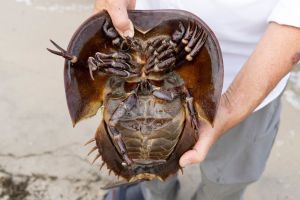Cape Cod’s Unsung Heroes: The Vital Role of Horseshoe Crabs in Our Ecosystem

Cape Cod, with its pristine beaches and diverse ecosystems, is not only a haven for sun-seekers but also home to a crucial marine inhabitant – the horseshoe crab. Often overlooked, these ancient arthropods play a vital role in maintaining the delicate balance of our coastal ecosystem. In this blog post, we’ll delve into the reasons why horseshoe crabs are indispensable to Cape Cod, Massachusetts, and why their conservation is essential for the well-being of our local environment.
The Living Fossils of Cape Cod
Horseshoe crabs, often referred to as “living fossils,” have roamed the Earth’s oceans for over 450 million years. Their unique anatomy and behavior make them a fascinating species worthy of attention and protection. Along the shores of Cape Cod, these remarkable creatures contribute significantly to the health and sustainability of our coastal ecosystem
.
1. Ecological Keystone Species
Horseshoe crabs are considered an ecological keystone species, meaning they have a disproportionately large impact on their ecosystem relative to their abundance. The eggs they lay provide a critical food source for migratory shorebirds, including the red knot, whose journey from the Arctic to Tierra del Fuego relies heavily on the horseshoe crab’s nutritious eggs for sustenance.
2. Biomedical Importance
Beyond their ecological role, horseshoe crab blood has unique properties that are crucial for human health. The blue blood of horseshoe crabs contains Limulus amebocyte lysate (LAL), a substance used to test medical equipment for bacterial contamination. This biomedical use underscores the significant contribution of horseshoe crabs to human well-being and the pharmaceutical industry.
3. Beach Nourishment and Erosion Control
The activities of horseshoe crabs, such as burrowing and feeding, play a part in beach nourishment and erosion control. Their presence helps aerate and mix sediment, contributing to a healthier coastal environment and mitigating the impacts of erosion.
4. Biodiversity Support
Horseshoe crabs support biodiversity by providing habitat and food for various marine organisms. Their eggs, in particular, serve as a crucial energy source for a variety of marine life, creating a ripple effect that benefits the entire coastal food web.
Conservation Efforts for the Future
As the Cape Cod community continues to grow, it is imperative that we recognize and support conservation efforts for horseshoe crabs. Preserving their habitats, monitoring population health, and raising awareness about their ecological importance are key steps in ensuring the long-term sustainability of this remarkable species and, consequently, the health of our local ecosystems.
Conclusion: Horseshoe crabs may be humble in appearance, but their significance to the Cape Cod ecosystem is profound. By understanding and appreciating their ecological importance, we can foster a sense of responsibility for the conservation of these ancient creatures and contribute to the overall health and resilience of our cherished coastal environment.
